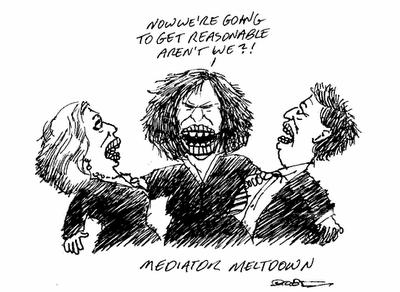The goal within a conflict in a church ministry is not to provide justice
through judgment. Justice, ultimately,
is God’s task, to offer the perfect balance of justice and mercy to all
men. Being human, full of human
motivation and reactions, our balance between justice and mercy is a bit
off-kilter. Our purpose, again, is to
create a place of safety for everyone.
The best way to create safety is not to have a context of
crime-and-punishment, but a context of repentance and reconciliation. This means that the ideal, although not
always realized, is to give anyone who is in conflict a place of safety because
of their neccessity to have a space apart from the usual actions of the
world. If someone acts in opposition to
the rules of the ministry, the main goal is not to punish them for their wrong
action, but to convince them that such action is in opposition to everyone’s
good.
How to respond to broken rules or conflict:
Patience—First of all, the Spirit fruit of patience is necessary. Conflict is rarely resolved quickly, and it
takes as long as it takes. If a person
is belligerent, then the leader must have “long-suffering” (to use the KJV
term) with the one confronting them in order to have the success of bringing
peace. Part of this patience is that we
invite them to give us their perspective of what happened.
Approaching Privately— It is best to speak to each person involved in a conflict separately. Everyone needs to speak their perspective,
but in the midst of a conflict, no one is able to hear the other person’s
perspective. Also, if someone is doing
something inappropriate, it is best to confront them about it without adding to
their shame by confronting them in front of their friends—especially because
being in front of their friends might encourage them to act with bravado
instead of thinking about the larger perspective.
Listening—In order for us to understand the conflict, we must listen to the reason
of the person who is initiating the conflict.
The goal of listening is twofold.
First of all, if we are going to make a right judgment of the situation,
we must understand the full context, and that will only be done by listening to
whoever is causing the conflict.
Secondly, we need for those who are causing the conflict to feel heard
and understood. Thus, we are not
listening as a goal in and of itself, but we are responding to what the other
person is saying, and asking appropriate, not leading, questions. When they feel understood and heard, we can
move on to responding.
Objectivity—It is important in a conflict between two participants that the leader not
take sides. The participant must see
that the leader is “no respecter of persons”, willing to look at a conflict
from both sides. This means that we need
to consider what this conflict means from all parties involved and to speak to
each of them from their perspective. We
also need to see that there is almost never a single wrong party in a
conflict. It takes one person to begin a
conflict, but it takes more than one to continue it. It's not our place to place blame, but to
create a safe place for everyone. This
means that whomever took part in the conflict must be spoken to, fairly, about
their part in perpetuating it. Also,
objectivity means that we cannot take the sides of any of our co-leaders who
have perpetuated the conflict. If any
leader—even ourselves!— is involved in aggressive behavior, we must apologize
and make no excuses for them because they are a leader.
Find Agreement—One way to quickly defuse a conflict is to find something to agree on with
each person you are dealing with. You
can tell someone that you understand their perspective or that you agree that
what was done to them was wrong, or just some part of what they said. To agree with them is to defuse any idea that
you are enemies. Instead, you have made
a connection with them and they will be more ready to listen to you.
Humor—Another way to defuse a situation is to use humor in speaking. Not humor at anyone’s expense, but if you can
speak lightly, it makes the situation less heavy and eases the minds of those
involved.
Speaking for Peace—What response we give is based on two perspectives—first of all, their
point of view, and also the perspective of the community. Our response to them needs to recognize their
needs and speak to them from their understanding of what happened. Then we need to bring them into the larger
perspective of the community, and how their actions aren’t appropriate for
everyone else. A very few people won’t
care about others or their needs, but this is rare. When we speak to them about this, we need to
be gentle, remembering that resolving conflict is a part of the ministry to
everyone involved, including those who cause the conflict.
Disciplining— For some smaller rules (such as blasphemy) a gentle (even humorous)
reprimand is enough. But if someone has
broken a serious rule—stealing, violence or aggressiveness, or selling drugs
for example—then there should be a discipline that is appropriate. If someone is loudly threatening someone
else, then they might be asked to leave for the day. If a person acts with violence, they might be
asked to leave for longer. The reason
for discipline is to communicate to the whole community that everyone’s
security is important and to communicate that certain actions cannot be allowed
in this safe place. For someone who
knows that they have done something very inappropriate for the church, they
might actually appreciate a small amount of discipline as a kind of
penance. Again, just make sure that the
discipline is appropriate with the rule broken.






No comments:
Post a Comment